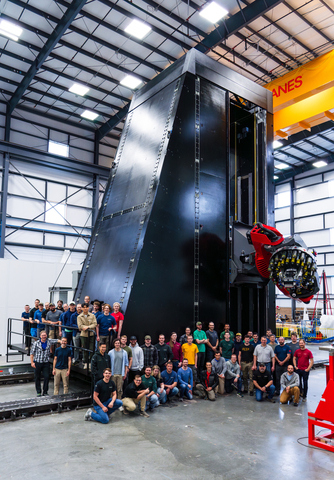Rocket Lab Begins Installation of Large Carbon Composite Rocket-Building Machine
The 90-tonne Automated Fiber Placement (AFP) machine has been custom-designed and built for Rocket Lab and is expected to save around 150,000 manufacturing hours in the Neutron rocket’s production process.

Rocket Lab's automated fiber placement machine which will build large composite structures for the Neutron rocket. (Photo: Business Wire)
The custom-built 99 ton (90 tonne), 39 ft tall (12-meter) robotic machine, American-made by Electroimpact in
The autonomous machine can move up to 98 ft (30 meters) in length and lay down continuous carbon fiber composite at a rate of 328 ft (100 meters) per minute. The AFP machine also has a fully automated real-time inspection system that hunts for miniscule defects throughout the laminated carbon composite and alerts the machine operator of any issues before the machine begins laying down the next layer, providing additional assurance that these critical structures of the launch vehicle meet Rocket Lab’s high-quality standards required for reusable Neutron launches.
As Neutron’s carbon composite structures move into full-scale production, this autonomous machine is expected to introduce significant time-savings of 150,000+ manufacturing hours into the production process.
Rocket Lab founder and CEO, Sir Peter Beck, says: “As we build the world’s largest carbon composite rocket, it makes sense that we require a world-first carbon composite fiber placement machine. We’re combining our proprietary flight-proven carbon composite technology, additive manufacturing, and autonomous robotics to design and build large-scale aerospace components at a pace that will support not only Neutron’s launch cadence, but support Electron and carbon composites structures for our spacecraft customers too. We worked closely with our excellent partners at Electroimpact to create this robot and we’re thrilled with the results. It’s an innovative machine producing a next-generation rocket from one of the birthplaces of the aerospace industry in
The AFP machine will also be leveraged to print smaller carbon composite Neutron structures, first stages of Rocket Lab’s Electron launch vehicle, and other flight-proven carbon composite structures for space including spacecraft structural panels and assemblies, solar panel substrates, carbon composite tanks and primary structures, and custom projects for the aerospace industry.
About Neutron
Neutron is the new medium-lift reusable launch vehicle by Rocket Lab. Capable of carrying up to 13,000 kg to low Earth orbit, Neutron is designed to deliver constellations of satellites to space at once, important national security missions, and human exploration beyond Earth’s orbit. Neutron will be the world’s first medium-lift carbon composite rocket, building off of Rocket Lab’s proprietary and flight-proven techniques utilized across 50+ launches of its Electron carbon composite small orbital launch vehicle. Powering Neutron is Rocket Lab’s new 3D printed reusable rocket engine Archimedes, an oxygen-rich staged combustion engine using liquid oxygen and methane propellants that is designed for rapid reusability, deep throttle ability for multiple engine burns in space, and for propulsive landings when returning to the launch site. Neutron will launch and land at its own dedicated launch and test range within Rocket Lab Launch Complex 3 at the Mid-Atlantic Regional Spaceport on
+ About Rocket Lab
Founded in 2006, Rocket Lab is an end-to-end space company with an established track record of mission success. We deliver reliable launch services, satellite manufacture, spacecraft components, and on-orbit management solutions that make it faster, easier, and more affordable to access space. Headquartered in
+ Forward Looking Statements
This press release contains forward-looking statements within the meaning of the Private Securities Litigation Reform Act of 1995. We intend such forward-looking statements to be covered by the safe harbor provisions for forward looking statements contained in Section 27A of the Securities Act of 1933, as amended (the “Securities Act”) and Section 21E of the Securities Exchange Act of 1934, as amended (the “Exchange Act”). All statements contained in this press release other than statements of historical fact, including, without limitation, statements regarding our launch and space systems operations, launch schedule and window, safe and repeatable access to space, Neutron development, operational expansion and business strategy are forward-looking statements. The words “believe,” “may,” “will,” “estimate,” “potential,” “continue,” “anticipate,” “intend,” “expect,” “strategy,” “future,” “could,” “would,” “project,” “plan,” “target,” and similar expressions are intended to identify forward-looking statements, though not all forward-looking statements use these words or expressions. These statements are neither promises nor guarantees, but involve known and unknown risks, uncertainties and other important factors that may cause our actual results, performance or achievements to be materially different from any future results, performance or achievements expressed or implied by the forward-looking statements, including but not limited to the factors, risks and uncertainties included in our Annual Report on Form 10-K for the fiscal year ended December 31, 2023, as such factors may be updated from time to time in our other filings with the Securities and Exchange Commission (the “SEC”), accessible on the SEC’s website at www.sec.gov and the Investor Relations section of our website at www.rocketlabusa.com, which could cause our actual results to differ materially from those indicated by the forward-looking statements made in this press release. Any such forward-looking statements represent management’s estimates as of the date of this press release. While we may elect to update such forward-looking statements at some point in the future, we disclaim any obligation to do so, even if subsequent events cause our views to change.
View source version on businesswire.com: https://www.businesswire.com/news/home/20240808270093/en/
+ Rocket Lab Media Contact
Morgan Connaughton
media@rocketlabusa.com
Source: Rocket Lab USA, Inc.







